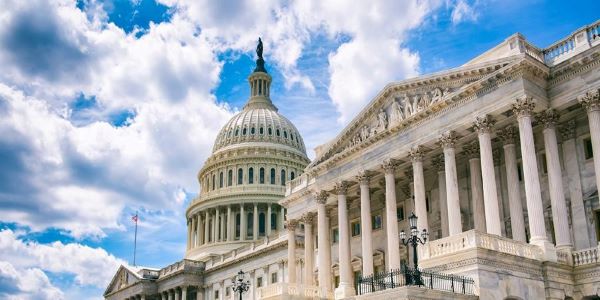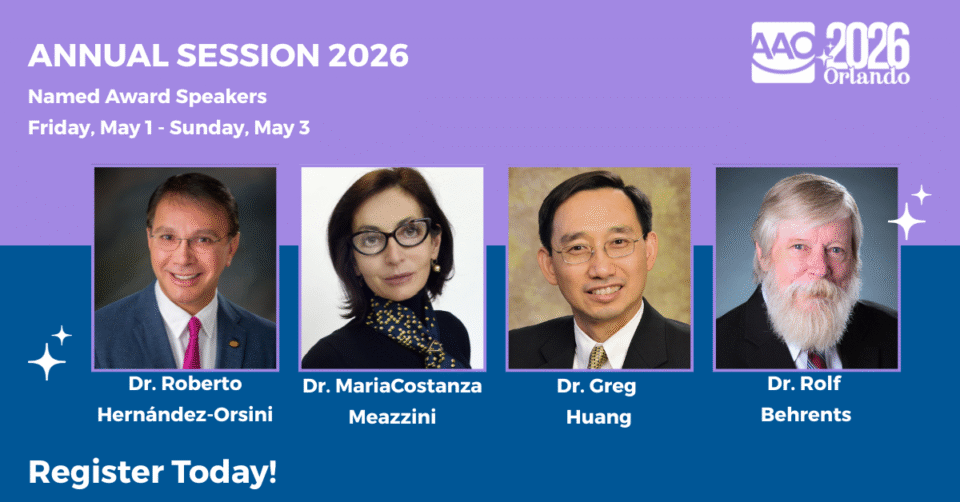The AAO continues to grow its advocacy innovation and influence on a range of policy issues at the federal and state levels. In the 2024 AAO Public Policy Survey (conducted November 26, 2024 – January 13, 2025), AAO members indicated their top concern is overburdensome regulations.
Below is an in-depth look at the budget reconciliation process in Congress via the “One Big Beautiful Bill Act” (OBBBA) and its potential for impact on AAO members and their patients. You’ll find the latest updates and key provisions that are important for AAO members, as health care providers and business owners. The AAO Advocacy team works closely with our federal lobbying team in Washington, D.C. Cozen O’Connor Public Strategies, to advocate for AAO priorities in the OBBBA.
The OBBBA is a complicated and comprehensive piece of legislation that spans over 1,000 pages. It encompasses a wide range of provisions, including tax reforms, defense spending increases, and changes to healthcare and social programs. The AAO Advocacy team continues to take an evidence-based approach to analyzing the bill for AAO members, their teams, and patients to identify both favorable components and elements we oppose or may not fully support.
As always, our goal is to make sure AAO is “at the table” as we actively engage with elected officials and key stakeholders to communicate the impact of legislation and advocate for the orthodontic specialty and AAO members’ patients.
Deduction of State-Level Pass-Through Entity Taxes
Of concern for many orthodontic practices is a provision of the OBBBA that would eliminate the ability of certain pass-through entities, specifically those defined as specified service trades or businesses (SSTBs), including orthodontists and dentists, to deduct state-level pass-through entity taxes (PTET) on their federal returns.
SSTBs already face limitations under the tax code, including phase-outs of the Qualified Business Income (QBI) deduction based on income thresholds. Eliminating the PTET deduction could potentially create staff reductions, service limitations, and even practice closures, directly affecting patients’ access to care.
The AAO joined over 20 organizations in the Organized Dentistry Coalition (ODC) and beyond in sending a letter to House and Senate leadership to advocate for AAO member small business owners and express our strong concerns with the proposed eliminations of PTET.
Your Grassroots Engagement Makes a Difference: Take Action Now!
Please take action by CLICKING HERE to contact your senators and voice your opposition to a provision in the House-passed budget reconciliation bill that unfairly targets small business dental practices, and other service-based professions, eliminating the ability to deduct pass-through entity taxes (PTET) at the federal level.
Deeper OBBBA Insights for AAO Members (Updated June 6, 2025)
On May 22nd, the U.S. House of Representatives advanced its budget reconciliation package, the One Big Beautiful Bill Act (OBBBA), by a narrow vote of 215 to 214. The legislation was passed with all Republican votes. Meanwhile, all House Democrats and two Republicans (Rep. Thomas Massie of Kentucky and Rep. Warren Davidson of Ohio) voted against it. Rep. Andy Harris (R-MD), who chairs the conservative House Freedom Caucus, voted present (which is a form of abstaining).
Budget Reconciliation: Congress is pursuing this legislation–strongly supported by the current Administration–through the budget reconciliation process, which is a legislative process in the U.S. Congress that allows for expedited consideration of certain tax, spending, and debt limit legislation.
Budget reconciliation bills can be passed by a simple majority in the U.S. Senate (which can be as low as 50 votes plus a tie-breaking vote from the Vice President). This 50-vote threshold is key because it enables Senate Republicans to pass the legislation on their own without the support of Senate Democrats.
Key Provisions: The One Big Beautiful Bill Act is meant primarily to extend the Tax Cuts and Jobs Act of 2017 (TCJA) and would make various spending cuts to maintain these tax cuts.
Key provisions from the legislation that are relevant to AAO members and their practices include:
- Taxes:
- Extension of Current Tax Rates: Sec. 112001 of the legislation makes permanent the modified federal income tax bracket schedule and lower tax rates created by the Tax Cuts and Jobs Act of 2017. The provision also adds an additional year of inflation adjustment to all brackets except for the top bracket (37 percent).
- State and Local Tax (SALT) Deduction: Sec. 112018 of the legislation would increase the SALT cap to $40,000 ($20,000 for a married taxpayer filing a separate return). The SALT cap would also start phasing down once income reaches $500,000. The phaseout range ends at $600,000, when taxpayers would again face the $10,000 cap.
- As part of the SALT cap language, the House’s text prohibits pass-through entity taxes (PTET), which small businesses have used to navigate constraints with the $10,000 SALT cap. For many small businesses, this provision removes the ability to claim a deduction of state income tax payments on your federal tax return. AAO is working with the ADA and other oral health groups to weigh in with the U.S. Senate on the problematic nature of this inclusion.
- Deduction of Domestic Research and Development (R&D) Expenditures: Sec. 111002 of the legislation permanently allows taxpayers to immediately deduct domestic research or experimental expenditures paid or incurred in taxable years beginning after December 31, 2024.
- Additionally, small business taxpayers with average annual gross receipts of $31 million or less will generally be permitted to apply this change retroactively to taxable years beginning after December 31, 2021.
- Medicaid:
- Medicaid Provider Screening: Sec. 44105 of the legislation requires states to conduct monthly checks of databases or similar systems to determine whether HHS or another state has already terminated a provider or supplier from participating in Medicaid and to also disenroll them from the state’s Medicaid program.
- Sec. 44106 of the legislation further codifies the requirement that state Medicaid programs check, as part of the provider enrollment and re-enrollment process and on a quarterly basis thereafter, the Social Security Administration’s Death Master File to determine whether providers are deceased and enrolled in the state’s Medicaid program.
- Medicaid Eligibility: The legislation would impose Medicaid eligibility reforms for certain populations.
- In particular, Sec. 44141 of the legislation would require states to establish community engagement requirements for able-bodied adults without dependents as a condition for enrolling in Medicaid. An individual can meet the community engagement requirements during a month by working at least 80 hours, completing at least 80 hours of community service, participating in a work program for at least 80 hours, enrolling in an educational program for at least 80 hours, or a combination of these activities for at least 80 hours.
- Moreover, Sec. 44111 of the legislation would discourage Medicaid Expansion States from using their state Medicaid funds to offer Medicaid coverage for undocumented immigrants. This Section accomplishes this objective by reducing the Federal Medical Assistance Percentage (FMAP) for these states by 10 percentage points.
- Medicaid Supplemental Payments: Medicaid supplemental payments are additional funds provided by the government to healthcare providers, especially hospitals, to help cover the gap between the cost of care and the lower payments received from Medicaid patients.
- Sec. 44132 of the legislation would impose a moratorium on new or increased state provider taxes. States often impose provider taxes to fund their Medicaid programs.
- Sec. 44133 of the legislation would direct HHS to limit state directed payments for services from exceeding the total published Medicare payment rate in Medicaid Expansion states and 110 percent of the total published Medicare payment rate in non-Medicaid Expansion states. Currently, many states have state directed payments that reach the average commercial rate (which is higher than the Medicare payment rate). State Directed Payments in Medicaid are payment arrangements approved by the Centers for Medicare and Medicaid Services (CMS) that allow states to require Medicaid managed care plans to pay providers according to specific rates or methodologies to support delivery system reforms and access to care. This section would not affect total payment rates for state directed payments approved prior to this legislation’s enactment.
- Medicaid Provider Screening: Sec. 44105 of the legislation requires states to conduct monthly checks of databases or similar systems to determine whether HHS or another state has already terminated a provider or supplier from participating in Medicaid and to also disenroll them from the state’s Medicaid program.
- Student Loans:
- Deferred Interest on Student Loans During Dental Residencies: Sec. 30022 of the legislation amends the terms of medical and dental residency deferments for loans disbursed on or after July 1, 2025, to allow for zero interest accrual for up to four years.
This provision resembles a narrower version of the Resident Education Deferred Interest (REDI) Act, which AAO has long advocated, the current average student loan debt for an orthodontist after completing residency being $567,000. More details on the impact of that debt can be found at AAOinfo.org/studentdebt.
- Deferred Interest on Student Loans During Dental Residencies: Sec. 30022 of the legislation amends the terms of medical and dental residency deferments for loans disbursed on or after July 1, 2025, to allow for zero interest accrual for up to four years.
Current Political Dynamics Related to OBBBA
Following the U.S. House of Representatives’ passage of the legislation at the end of May, the U.S. Senate is now set to take up consideration of the One Big Beautiful Bill Act.
The U.S. Senate is planning to make their own reforms to the legislation. Senate Republican leadership will need to navigate the concerns of both moderate members (who think that the legislation’s Medicaid reforms would reduce health care access) and conservative members (who think that the legislation does not go far enough in addressing spending).
Many of the internal policy disagreements within the House Republican conference are similar within the Senate Republican conference. Of note, Sen. Josh Hawley (R-MO) wrote a New York Times op-ed calling on Congress to not cut Medicaid as part of its budget reconciliation package.
One unique challenge Senate Republicans will face in advancing the legislation is the ability of the U.S. Senate Parliamentarian to strike down provisions without budgetary implications. Unlike traditional legislation, budget reconciliation spending must be focused on taxes and mandatory spending. A senator must raise a point of order if they believe an item is outside of the reconciliation rules. It is possible to override the Parliamentarian’s determination, but such an override would be extremely controversial and could establish an unwanted precedent.
In the event that U.S. Senate Parliamentarian strikes down certain provisions, the Senate will need to make reforms to the legislation so that it can advance through the chamber. If the legislation passed by the Senate is different than what was passed in the House, the House will have to vote on the amended legislation.
Senate Republicans are currently expected to work through June to develop and pass their own version of the legislation. While President Trump has expressed his desire for budget reconciliation legislation to be completed by July 4th, 2025, this target should not be viewed as a firm deadline. It remains possible that Congress will need to cancel its upcoming summer recesses to develop legislation that can pass both the U.S. House of Representatives and the U.S. Senate.
AAO’s Advocacy team and lobbyists at Cozen O’Connor Public Strategies will continue to monitor the bill closely and weigh in on evidence-based priorities for AAO members.
Your Help is Needed Now More Than Ever Through AAOPAC
The AAO is deeply committed to patient health and safety through orthodontic care provided by qualified specialists. Our mission, to advance the art and science of orthodontics through education, advocacy, and research, has never been more important.
AAO’s new fiscal year began June 1. You can make your AAOPAC contribution for fiscal year 2025-2026 now! The bipartisan AAOPAC helps fuel our advocacy success in Washington, DC and in states throughout the country. Contributions can be made online via credit card at AAOPAC.org.
It only takes a few minutes to complete your contribution, using your e-mail address associated with your AAO membership. You can also view your giving history and profile.
Our AAOPAC Pillars of Giving are working and the AAO’s bipartisan advocacy influence continues to grow through member grassroots engagement. Your grassroots voice and AAOPAC support make all the difference!



